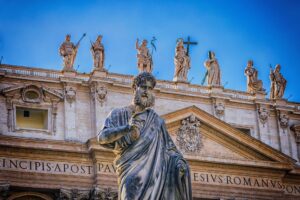Once sure of God’s existence and nature, the next step in my journey was to determine if God has revealed himself to man other than through the natural world. I still had many questions of course, like the problem of suffering, the question of religion, and many others. But like I said at the end of my last post, I learned some humility, because the mere fact that I can use my intellect to raise these questions is thanks to God.
Why would God, who is perfect and lacks nothing, create an intelligible universe that is so fine-tuned for the existence of intelligent beings like us? A universe that can be discovered through our intellect. Could it be that He made us so that we could know Him? Since God wills our existence, it’s clear that He is personal. We are personal to Him. But has He revealed Himself to us in a personal way? Has He spoken through all religions, or through one religion in particular?
The case against religion
Atheists like to point out that religions are geographic and cultural, meaning that people tend to believe the religion (or some form of it) that they were born into. Furthermore, they argue, that because the different religions make exclusive claims about God and how to be saved, they cannot all be true. And since they contradict each other they are incompatible. Therefore, they conclude that God must not exist.
Some people say that although religions may differ in their exclusive claims about God, they all teach “higher truths” that makes them compatible. However, as atheists tend to point out, each religion’s claims about God are specific and exclusive of other religious doctrines. They don’t simply teach “higher truths”, and believers follow the specific claims taught by their own religion.
They make a good point actually. And this was one of the main arguments that challenged me to investigate God’s existence in the first place. The response to the argument is not in religion, but in logic.
The law of non-contradiction
The atheist’s case against religion makes use of Aristotle’s law of non-contradiction, a basic law of logic that we all use in our daily lives, even without acknowledging it. This law states that two claims that contradict each other cannot be true in the same sense and at the same time. Without this principle we couldn’t know anything that we do know. Try it on anything and you’ll see. For example, when you are about to cross the street, either a car is passing by or it’s not, but it cannot be doing both things (passing and not passing) at the same time.
The Law of Non-contradiction is a first principle of logic. It’s so fundamental to human reason, that to deny the law of non-contradiction is to affirm it at the same time. Why? Because the law of non-contradiction is either true or it’s false. By denying it you would be claiming that it’s false. What it cannot be, is true and false at the same time. We can’t escape it.
However, the atheist’s reasoning is only partially correct. It’s missing one important point. Although, according to the law of non-contradiction, contradicting religions cannot be all true, it is perfectly logical that one religion is the true revelation of God. In other words, either all religions are false, or only one is true; but they cannot all be true.
Many people want to believe that all the different religions can be all true because as a society we have come to believe that everyone has their own personal truth or because of the belief that truth is relative. Well, is it?
Truth is objective, not relative
What is truth? It is that which is in accordance with fact or reality.
We live in an era of relativism where I have my “truth”, you have your “truth” and everyone has their own “truth”. What is true for you is not true for me. As nice as it sounds, it doesn’t stand the test of reason and defies common sense.
Sure we all have our own feelings and perspective of things, but we have confused opinions with truth. To make the claim that ‘truth is relative’ is self-defeating, because it claims that such statement is ‘absolutely true’ (the absolute truth that ‘truth is relative’). But by its own merit the claim that ‘truth is relative’ cannot be ‘absolutely true’ or ‘objectively true’. It defeats itself.
Let’s put it differently. To say that truth is relative (or subjective) is arguing in circles. Because, if everything is true, then nothing is false; and if nothing is false, then the statement ‘everything is false’ would have to be true. We can’t have it both ways.
Religious pluralism
This is not to say that if there is one true religion, the other ones must be entirely false. This is where some religious fundamentalists get it wrong. They still may share some elements of truth. Like for example, the desire for God, man’s longing for the transcendent, the sense of community or the existence of one God (for monotheistic religions).
It’s important to recognize that every person deserves respect in virtue of their dignity as human beings, regardless of their beliefs. And they have the right to act according to their deeply held religious beliefs (so long as they don’t hurt anyone). However, it is not reasonable to hold all beliefs or ideas to be true, and it is not loving to leave people away from the truth.
Since my search led me to believe in the existence of One God, I focused my attention on monotheistic religions. The three major monotheistic religions share someone in common, albeit with very different views: Jesus of Nazareth. He really is the key. Either Jesus is the Son of God or He is not, but he cannot ‘be’ and ‘not be’ at the same time.
Therefore, Jesus Christ is either legend, liar, lunatic or LORD. So, I had to go after the evidence.



